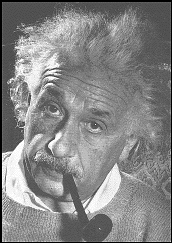|
Some centuries distinguished themselves from previous ones because
they were dominated by certain characteristics, such as the expansion
of Islam; the Mongol conquests; or the Renaissance.
What distinguishes the 20th century most is a technological revolution so sweeping that the most learned men of the past would be thoroughly lost in today's environment. The main source for technological progress is science and the undisputed symbol of modern science is
Between 1905 and 1925 Einstein transformed mankind's understanding of nature on every scale, from the smallest to that of the cosmos as a whole. His crowning glory, perhaps the most beautifiul theory in all of science, was the general theory of relativity, published in 1916. Now, nearly a century after he began to make his mark, we are still exploring Einstein's universe. Furthermore, his work provided the theoretical underpinnings for such advances as television, lasers and semiconductors. And the scientific achievements - nuclear power, space travel, electronics - all bear his fingerprints. Science is only one aspect of our remarkable century and genius in this one area alone would be insufficient for a nomination as Person of the 20th century. Such a person also has to exemplify some of the essence of our century, which has been characterized at its worst by excessive nationalism, fundamentalism, militarism, and greed, and at its best by global awareness, international cooperation, democratization, and generosity.
Let's consider Einstein's contribution on three important issues :
Nationalism
The question for today remains:
Tolerance
As early as 1929 he warned in a letter to Chaim Weizmann: '... should we be unable to find a way to honest cooperation and pacts with the Arabs, then we have learned nothing during our 2,000 years of suffering ..'
In April 1938 in New York, after he spoke out for a Jewish homeland this warning : In June 1944 : '.. the Jews will succeed in a good measure of cooperation with the Arab people if only both our people and the Arabs succeed in conquering that childhood complaint of narrow-minded nationalism ... aggravated by professional politicians'. It would take more than fifty years for an Israeli Prime Minister to express similar sentiments. Was Einstein then naive, or simply too far ahead of his time ?
Militarism
Realistically, when Hitler came to power Einstein had the courage to change his opinion. After 1933, he no longer promoted war resistance, but advocated rearmament of Western nations to the consternation of diehard pacifist circles. In 1933 Einstein travelled to England to alert Churchill about the danger of Nazism. On his arrival in America he called for 'a sustained co-operation between the United States and the British Empire, including possibly France and Russia'. That was prophetic in 1935 when - with the exception of Churchill - nobody else envisaged such an unusual war alliance. Later, when it became clear that there was a danger that Nazi Germany could be first to produce an atomic bomb he signed that fateful letter to Roosevelt, but after the war Einstein became the most significant voice to warn against the folly of a nuclear arms race - the legacy of which are 25 000 nuclear weapons in an unstable Russia. It would take somebody like McNamara another fifty years to reach the conclusion that a strategy of mutually assured destruction is untenable. Einstein was politically active until the last week of his life when he signed the Russell / Einstein appeal to stop all nuclear testing, an appeal that bore fruit in the nuclear test ban treaty eight years after his death. The following non-profilaration treaty succeeded to prevent about 35 nations to enter the nuclear club. (The author of this Hyperhistory can testify that a referendum against nuclear weapons in Switzerland succeeded largely on account of this treaty) Unfortunately the great powers neglected to fulfill their obligations to reduce their own arsenals and nuclear profilaration - although greatly slowed down - has led presently to nine nuclear powers. Where is the Einstein of today to defend of what is left of this treaty? There are already voices calling the treaty a useless piece of paper, dismissing the fact that nine nuclear powers are less threatening than thirty or forty ! During the later part of this century greedy individualism has become ever more fashionable. Einstein certainly was very individualistic, but he was, nevertheless, always responsive to society and the causes of humanity - a true citizen of the world; he was famous but unimpressed by monetary rewards; and in a world of increasing one-dimensional specialization he remained a renaissance man who reminded us that the teaching of the humanities was more important for the preservation of our culture than just dry specialized knowledge. Bridging the gap between science and poetry he once called a discovery by his lifelong opponent, Niels Bohr ' the highest form of musicality in the sphere of thought.' Finally, a little gem from the great man to greet the next century : ' Whoever undertakes to set himself up- a fit rebuke to a century often led astray by fundamentalism and ideology. |
 Albert Einstein
Albert Einstein